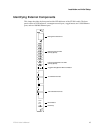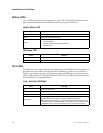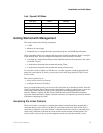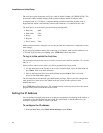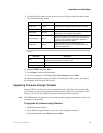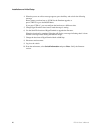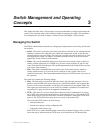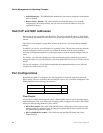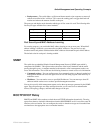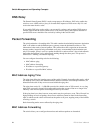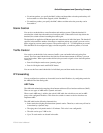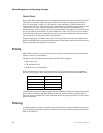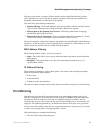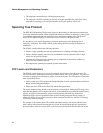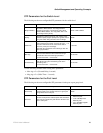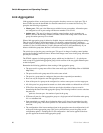
ZT8101 User’s Manual 23
Switch Management and Operating Concepts
• Back pressure—The switch fakes a collision and then transmits a jam sequence to ensure all
stations are notified of the “collision.” This causes the sending ports to trigger their back-off
routines and reduces the amount of traffic on the port.
The port type and duplex mode determine which type of flow control is used. The following table
lists the port types and their flow control methods.
Port Security and MAC Address Learning
For security purposes, you can disable MAC address learning on one or more ports. When MAC
address learning is disabled, a port cannot discover MAC addresses. The port receives only
broadcast traffic and packets with destination MAC addresses that match the port's MAC address.
The default value for each port is learning enabled.
SNMP
The switch has an embedded Simple Network Management Protocol (SNMP) agent which is
compliant with SNMPv1. This agent monitors the status of the board’s hardware and the traffic
passing through its ports. A computer attached to the network, called a management station, can
access this information. The switch uses the following features to control access to its information:
• Community strings—You can configure up to four community strings so that only authorized
management stations can access the agent. You can set each string to grant either read only or
read/write access.
• IP address—You can restrict access to specified IP addresses. You can enter up to three IP
addresses which restricts access to these specified management stations.
You can also specify which management agents receive the trap messages generated by the SNMP
agent. These trap messages are status messages that alert you of events such as authentication
failure, STP topology changes, and link status changes on the port.
BOOTP/DHCP Relay
BOOTP and DHCP allow stations to obtain boot and TCP/IP information dynamically. The relay
agent allows them to obtain this information when the BOOTP/DHCP server is not on the same IP
interface as the end station. You can configure the switch so that the messages are forwarded from
one interface to the appropriate server on another interface.
Port Type Duplex Mode Flow Control
Fast Ethernet (10/100) Half Back pressure
Fast Ethernet (10/100) Full 802.3x compliant
Gigabit Ethernet Full 802.3x



